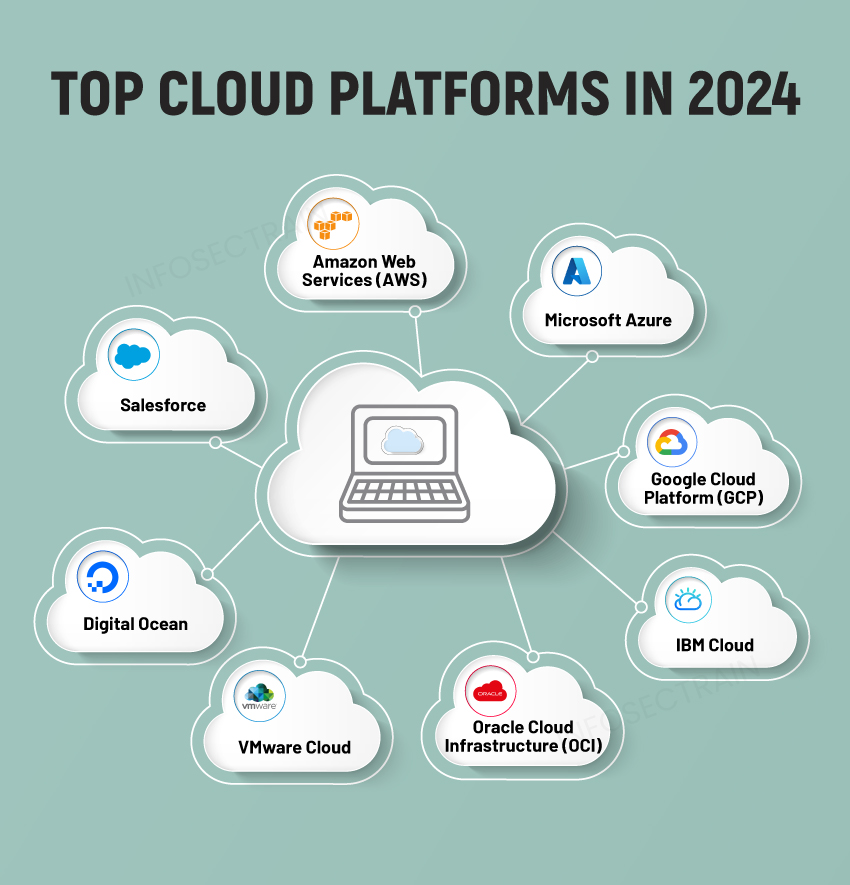Top Cloud Platforms to Watch Out in 2024
With the rapid evolution of the digital landscape, cloud computing has become a game-changer, revolutionizing how businesses operate and interact with technology. Cloud platforms have become the backbone of modern IT infrastructure, providing businesses with unparalleled scalability, flexibility, and cost-efficiency. According to the recent prediction from Gartner, Inc., end-user expenditure on public cloud services is anticipated to increase globally by 20.4% from $563.6 billion in 2023 to $678.8 billion in 2024, highlighting the industry’s immense growth and significance.

In this dynamic and competitive environment, a few cloud platforms have consistently stood out, capturing the attention of businesses worldwide. These platforms offer diverse services, from computing and storage to networking, databases, and analytics. Their impressive capability to meet the needs of diverse businesses, from small startups to multinational enterprises, has propelled them to the forefront of the cloud computing industry.
In 2024, there are several cloud platforms that deserve close attention. Let us delve into the top cloud platforms to watch out in 2024.
Top Cloud Platforms in 2024

1. Amazon Web Services (AWS)
As a pioneer and leader in cloud services, Amazon Web Services (AWS) continues to dominate the market with its vast infrastructure, extensive suite of offerings, constant innovation, and diverse services. With AWS Lambda for serverless computing, Amazon S3 for scalable storage, and AI/ML services, AWS is a compelling choice for businesses seeking reliability, scalability, and cutting-edge technology.
Key Features:
- On-demand scalable resources
- High uptime and global infrastructure for robust performance
- Wide range of storage services (e.g., S3, Glacier) for diverse data needs
- Vast suite of offerings, including serverless computing and AI/ML
2. Microsoft Azure
Microsoft Azure has been steadily gaining ground, providing a robust cloud platform with a strong focus on hybrid solutions. Azure’s seamless integration with Microsoft’s on-premises products, such as Windows Server and Office 365, makes it a popular choice for enterprises with existing Microsoft environments. With a huge global network of data centers, it ensures low-latency connectivity worldwide. Its close integration with Microsoft’s ecosystem enables seamless transitions and robust support for diverse applications, making Azure a preferred choice for enterprises seeking reliable, scalable, and innovative cloud solutions.
Key Features:
- Hybrid capabilities for seamless integration
- Diverse services, including AI, IoT, DevOps, and serverless
- Strong integration with the Microsoft ecosystem for streamlined operations
- Enterprise-grade security and compliance
3. Google Cloud Platform (GCP)
Google Cloud Platform (GCP) has emerged as a formidable player in cloud computing, renowned for its innovative technologies and focus on open-source solutions. It is Google’s suite of cloud computing services, encompassing various tools for computing, storage, databases, machine learning, and more. With its widespread reach and innovative edge computing initiatives, it has become a preferred option for businesses, from startups to large enterprises. Moreover, its scalability, reliability, and cost-efficiency further enhance its attractiveness as a versatile solution.
Key Features:
- Advanced data analytics and AI-driven solutions like BigQuery and TensorFlow
- Kubernetes-based container orchestration
- Global infrastructure and cost-efficiency
- Integration with Google’s ecosystem
4. IBM Cloud
IBM Cloud is a robust and versatile cloud platform that stands out for its industry-focused approach, offering specialized solutions such as blockchain, edge computing, and quantum computing. With a strong emphasis on security, hybrid cloud, and AI-driven automation tools, IBM caters to businesses with intricate needs. Its commitment to addressing specific industry requirements and stringent compliance measures makes it an appealing choice. Also, IBM Cloud’s global network of data centers and focus on sustainability initiatives solidify its position as a reliable choice for businesses seeking tailored cloud solutions featuring advanced technologies and stringent security measures.
Key Features:
- Industry-focused solutions, such as blockchain, edge computing
- Advanced AI capabilities for automation and analytics
- Strong security measures and compliance
- Tailored solutions for specific industries like healthcare, finance, and retail
5. Oracle Cloud Infrastructure (OCI)
Oracle Cloud Infrastructure (OCI) is a comprehensive cloud platform focusing on enterprise-grade solutions, database administration, and high-performance computing. OCI provides robust services, such as bare metal instances, virtual machines, and container solutions, which offer scalability. It seamlessly integrates with Oracle’s on-premises products, including Oracle Fusion Cloud Applications and Oracle Database. Its unique offerings encompass Artificial Intelligence/Machine Learning capabilities, edge computing, and integrated cloud-native tools, catering to diverse business needs. With a global network of data centers, OCI offers high-performance and low-latency access to cloud services.
Key Features:
- High-performance computing with bare metal instances
- Autonomous database and advanced networking
- Integration with Oracle’s on-premises products
- AI/ML services and scalable storage options
6. VMware Cloud
VMware Cloud is a potent hybrid cloud platform that leverages VMware’s extensive virtualization expertise. It enables seamless application migration, management, and operation across multiple cloud environments, such as on-premises, public, and private clouds. This makes it a great choice for enterprises with existing VMware environments. It facilitates deployment, enhances scalability, and drives innovation with tools like VMware Cloud Foundation and VMware Cloud on AWS. These solutions cater to organizations’ needs for flexibility, security, and optimal resource utilization in cloud infrastructure.
Key Features:
- Hybrid cloud expertise for seamless migration
- Unified management across various environments
- Advanced networking and security features
- Automation and orchestration tools for efficient operations
- Extensive application support and developer-friendly environment
7. DigitalOcean
DigitalOcean is a developer-friendly cloud platform renowned for its simplicity and ease of use. It caters primarily to developers, startups, and small to medium-sized businesses, offering straightforward cloud services, including Droplets (virtual machines), Kubernetes clusters, and managed databases. It is known for its user-friendly interface, predictable pricing, and focus on simplicity, making it an attractive option for those new to cloud computing. The focus on community support and comprehensive documentation enhances its appeal, allowing users to deploy and manage applications quickly without the usual complexities of larger cloud providers.
Key Features:
- Developer-friendly, simple cloud services
- Intuitive UI/UX and community support
- Virtual machines offering scalability and flexibility
- Managed Kubernetes service for container orchestration
- Cost-effective, scalable storage
8. Salesforce
Salesforce Cloud Platform is a powerful suite of cloud-based services renowned for its Customer Relationship Management (CRM) solutions. It encompasses various cloud offerings, including Sales Cloud, Service Cloud, Marketing Cloud, and more, enabling businesses to build, connect, and deploy custom applications and integrations. With AI-powered insights and seamless app integration capabilities, this platform facilitates automation, enhances productivity, and fosters innovation, making it a preferred choice for companies seeking efficient and tailored CRM solutions.
Key Features:
- Cloud-based CRM solutions
- Customizable applications with low-code tools
- Robust security and shared infrastructure
- Various cloud offerings such as Sales Cloud, Service Cloud
In the fast-paced landscape of cloud computing, 2024 holds great potential for remarkable advancements and innovations across several vital platforms. These top cloud platforms lead the way with their innovative features, extensive capabilities, and a strong emphasis on making businesses more accessible. Stay vigilant with these platforms, as they are poised to revolutionize the standards of excellence in 2024 and beyond.
Feel free to explore other blogs:
- Top Cloud Computing Trends In 2024
- Top Tools To Manage Your Apps In The Cloud?
- How to Build a Successful Career in Cloud Security
- Top Cloud Computing Interview Questions
- Highest-Paying Jobs in the Cloud Domain
- Tips To Secure Your Cloud
How can InfosecTrain Help?
At InfosecTrain, we deliver diverse online certifications as well as customized training courses on cloud computing and cloud security. These courses are invaluable resources for individuals seeking to enhance their expertise in these domains. Our curriculum is meticulously designed to offer comprehensive learning experiences, empowering participants with the essential skills and insights needed to thrive in the rapidly evolving landscape of cloud technology.
Through our courses, participants will gain a deep understanding of cloud architectures, deployment models, security protocols, and best practices. They will have access to cutting-edge resources, recorded sessions, and expert guidance, enabling them to navigate complex concepts confidently. Whether individuals are newcomers aiming to grasp the fundamentals or professionals aspiring to advance their careers, our courses cater to diverse skill levels and learning objectives.



 1800-843-7890 (IN)
1800-843-7890 (IN) sales@infosectrain.com
sales@infosectrain.com
 1800-843-7890 (India)
1800-843-7890 (India) 
